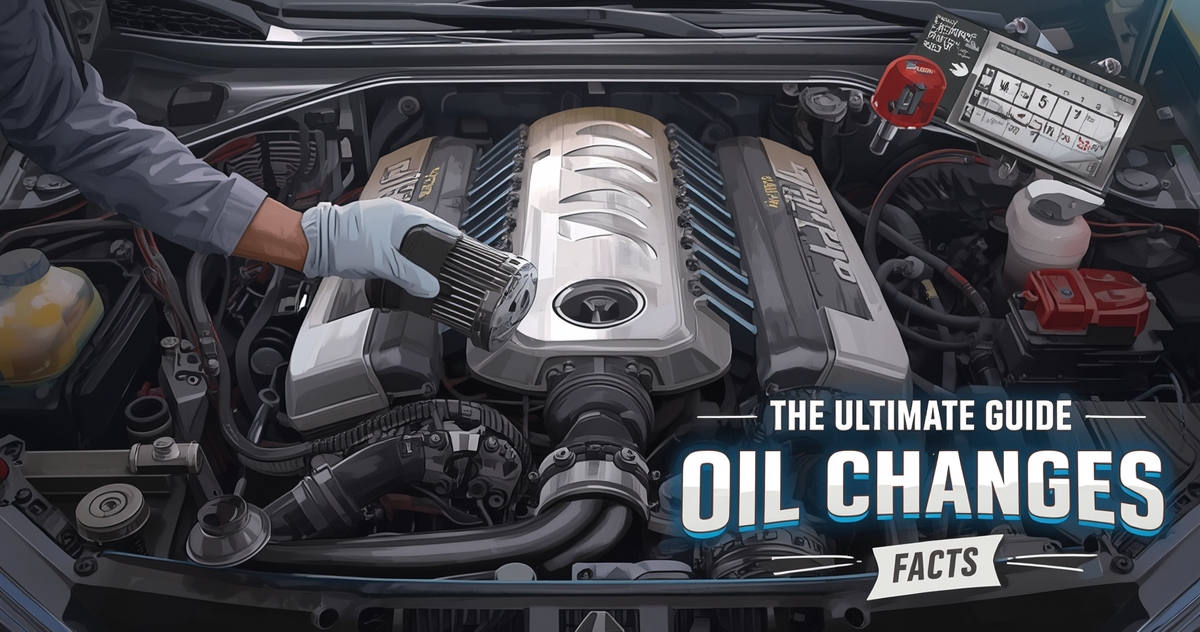For many drivers, oil changes are one of those routine car maintenance tasks that get pushed aside until the reminder light blinks on the dashboard. While it may feel minor, changing your oil on time is one of the best things you can do to keep your engine healthy, extend your vehicle’s life, and save money on costly repairs down the road. In this guide, we’ll break down everything you need to know about oil changes, including how often to schedule them, why filters matter, and key facts every car owner should understand.
Why Oil Changes Matter
Your engine has dozens of moving parts working under high heat and pressure. Motor oil reduces friction, keeps parts lubricated, and prevents overheating. Over time, oil collects dirt, dust, and debris, which reduces its effectiveness. If oil isn’t changed regularly, it thickens, turning into sludge that strains the engine and increases wear. This can lead to lower fuel efficiency and serious engine damage.
According to AAA, neglecting oil changes is one of the most common causes of breakdowns, yet one of the easiest to prevent. A timely oil change is a small investment compared to the thousands of dollars an engine replacement could cost.
How Often Should You Change Your Oil?
The old rule of thumb was every 3,000 miles, but modern engines and synthetic oils have changed the timeline. Today, many cars can safely go 5,000 to 7,500 miles between oil changes. Some newer models using full synthetic oil can even stretch to 10,000 miles.
That said, frequency depends on several factors:
- Driving habits: Stop-and-go city traffic or frequent short trips require more frequent oil changes than steady highway driving.
- Vehicle age: Older cars generally need oil changes sooner than newer models.
- Oil type: Conventional oil breaks down faster than synthetic, which lasts longer and protects better in extreme temperatures.
- Manufacturer’s recommendation: Always check your owner’s manual for the most accurate guidelines.
If you drive in New Jersey, where weather conditions can swing from freezing winters to hot, humid summers, oil breaks down faster under temperature stress. Regular oil change service in places like Bayonne, Boonton, or Kenilworth, NJ, can keep your car running smoothly year-round.
The Role of Oil Filters
Every oil change includes replacing the oil filter, and for good reason. The filter traps contaminants like dirt, dust, and tiny metal fragments before they circulate through your engine. Over time, filters become clogged and lose their ability to clean the oil. If left unchanged, dirty filters can cause restricted oil flow, putting added strain on the engine.
Think of the filter as your engine’s defense system. Fresh oil with a dirty filter won’t protect your car for long, so always replace both at the same time.
Conventional vs. Synthetic Oil: Which Is Better?
When it comes to oil changes, one question drivers often ask is whether they should use conventional or synthetic oil. Here’s a quick comparison:
- Conventional oil: Affordable and effective for older, lower-mileage cars. Needs more frequent changes.
- Synthetic oil: Designed for better performance and protection, especially in extreme temperatures. Lasts longer but costs more upfront.
- Synthetic blends: A middle ground that offers better performance than conventional oil without the full cost of synthetic.
While synthetic oil may seem pricier, it can save money in the long run by extending the time between oil changes and protecting engines from wear.
Signs Your Car Needs an Oil Change
Even if you’re tracking mileage, there are signs that your vehicle might need fresh oil sooner:
- Dark, dirty-looking oil on the dipstick
- The engine is running louder than usual
- Oil change or check engine light on
- Burning oil smell inside the car
- Poor fuel economy
If you notice any of these, don’t wait until your next scheduled service. Addressing oil issues early can prevent bigger problems.
Quick Facts About Oil Changes
Here are some helpful facts every driver should know:
- The average cost of an oil change in the U.S. ranges between $35 and $75, depending on oil type.
- Synthetic oil lasts about twice as long as conventional oil.
- According to Carfax, keeping up with oil changes can increase your vehicle’s resale value.
- The EPA reports that recycled oil can be re-refined into new motor oil, reducing waste and saving resources.
Finding a Reliable Oil Change Service in New Jersey
Whether you’re searching for an oil change in Bayonne, NJ, or routine service in Kenilworth, Springfield, or Bloomingdale, choosing a trusted location makes a big difference. Look for places that pair oil changes with other maintenance checks, so you get a full picture of your car’s health in one visit.
If you’re already heading to a car wash in New Jersey, some locations, like Wash Brands, make it easy by combining car wash services with oil changes. That way, you leave with not only a clean car but also the peace of mind that your engine is protected.
Tips to Extend the Life of Your Engine Oil
You can help your oil do its job better by practicing a few smart habits:
- Avoid excessive idling, which causes oil to break down faster.
- Keep up with routine maintenance like filter replacements and tune-ups.
- Use the right oil grade as recommended by your manufacturer.
- Check your oil level regularly, especially before long trips.
Wrapping It Up
Oil changes may feel routine, but they’re one of the simplest ways to protect your car and keep it running efficiently. By understanding the role of oil, filters, and proper timing, you can avoid costly repairs and enjoy smoother drives. Whether you’re a daily commuter in Bayonne or cruising through Boonton, regular oil changes are an investment in your car’s long-term health.
Ready to take care of both your car’s appearance and performance? Visit Wash Hounds Express to find convenient locations across New Jersey for oil changes and professional car wash services. Keep your engine healthy, your car clean, and your drives worry-free.




